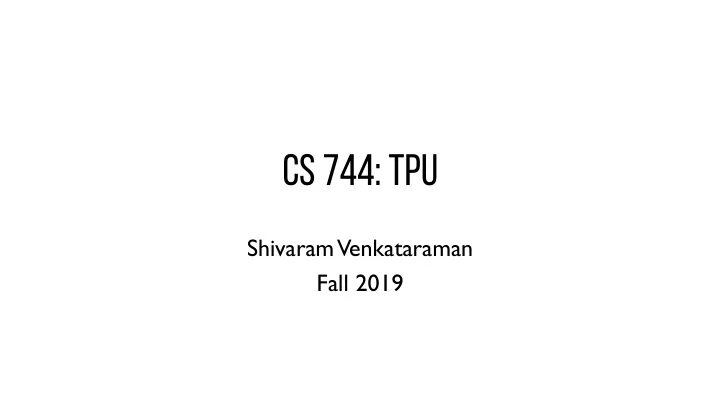

CS 744: TPU Shivaram Venkataraman Fall 2019
Administrivia Midterm 2, Dec 10 th – Papers from Dataflow Model toTPU – Similar format, cheat sheet etc. Poster session Dec 13 th – Template – Printing instructions – Reimbursement
Infiniband Networks Compute Accelerators Serverless Computing Non-Volatile Memory
MOTIVATION Capacity demands on datacenters New workloads Metrics Total cost of ownership (Depends on price ?) Power/operation Performance/operation Goal: Improve cost-performance by 10x over GPUs
WORKLOAD DNN: RankBrain, LSTM: subset of GNM Translate CNNs: Inception, DeepMind AlphaGo
WORKLOAD: ML INFERNCE Quantization à Lower precision, energy use 8-bit integer multiplies (unlike training), 6X less energy and 6X less area Need for predictable latency and not throughput e.g., 7ms at 99th percentile
TPU DESIGN CONTROL
COMPUTE
DATA
INSTRUCTIONS CISC format (why ?) 1. Read_Host_Memory 2. Read_Weights 3. MatrixMultiply/Convolve 4. Activate 5. Write_Host_Memory
SYSTOLIC EXECUTION Problem: Reading a large SRAM uses much more power than arithmetic!
ROOFLINE MODEL TeraOps/sec Operational Intensity: MAC Ops/weight byte
HASWELL ROOFLINE TeraOps/sec Operational Intensity: MAC Ops/weight byte
COMPARISON WITH CPU, GPU
ENERGY PROPORTIONALITY
SELECTED LESSONS Latency more important than throughput for inference • LSTMs and MLPs are more common than CNNs • • Performance counters are helpful Remember architecture history •
SUMMARY New workloads à new hardware requirements Domain specific design (understand workloads!) No features to improve the average case No caches, branch prediction, out-of-order execution etc. Simple design with MACs, Unified Buffer gives efficiency Drawbacks No sparse support, training support (TPU v2, v3) Vendor specific ?
DISCUSSION https://forms.gle/zhH9eCbdjMnaRLRB8
How would TPUs impact serving frameworks like Clipper? Discuss what specific effects it could have on distributed serving systems architecture
Recommend
More recommend